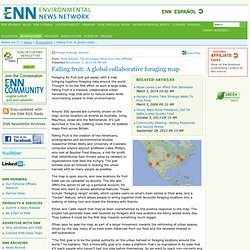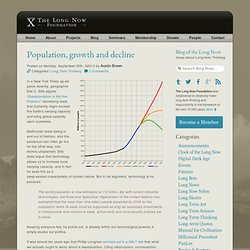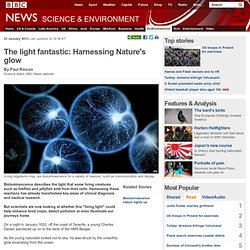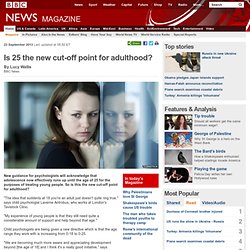

5 Visions For What Families Will Look Like In 2030. Over the past few generations, Western ideas about family have shifted dramatically.

People wait longer to have kids and many "boomerang" back to their parents' homes before finally setting out on their own. When they do finally leave, they often scatter far away from their hometowns. The elderly, meanwhile, are sent off into old age homes instead of staying at home with their communities. As more people move into cities, natural resources decline, climate change heats up, and the "sharing economy" continues to pick up steam, our notions of family will continue to shift. Falling fruit: A global collaborative foraging map. Foraging for fruit just got easier, with a map bringing together foraging data around the world.

Thought to be the first effort on such a large scale, Falling Fruit is a massive, collaborative urban harvesting map that aims to reduce waste while reconnecting people to their environments. Around 500 species are currently shown on the map, across locations as diverse as Australia, India, Mauritius, Israel and the Netherlands. It's just launched in the UK, collating more than 30 isolated maps from across Britain. Falling Fruit is the creation of two Americans, photographer and environmental studies researcher Ethan Welty and University of Colorado computer science adjunct professor Caleb Phillips, who met at Boulder Food Rescue, a not-for-profit that redistributes food thrown away by retailers to organizations that feed the hungry.
Ideas + impact. Let's say you're out for a walk one day, and you come across a part of the city that could use some work.

You have some ideas--a walkway and park here, some trees and shrubbery over there. You probably just keep it all to yourself. But what if you could put it to paper and share it with the world? Key to the Street, a new citizen-planning tool, allows for just this. The Global Aging Preparedness Index, Second Edition. » Population, growth and decline. In a New York Times op-ed piece recently, geographer Erle C.

Ellis argues “Overpopulation is Not the Problem,” dismissing fears that humanity might exceed the Earth’s carrying capacity and bring global calamity upon ourselves. The city of 2050. Sensor networks Experts predict that everything, from street furniture to roads to the homes we live in, will be connected to the network.

All these objects will produce vast amounts of data and some cities may build Nasa-style control centres to make predictions about city life, including where crimes may be committed. Smart buildings Buildings will have taken on a life of their own, controlling heating, lighting and security with little human intervention. Architects envisage buildings becoming far more sustainable, producing their own power and reusing rain water. Buildings may be able to store energy in huge batteries, while homes put excess electricity back into the smart grid. Robo-taxis It is likely cars will be self-driving.
Traffic lights will no longer be necessary. Farmscrapers. The Next Sea Monkey: A Dino-Shaped Nightlight Powered By Glowing Algae. The light fantastic: Harnessing Nature's glow. 23 January 2013Last updated at 19:39 ET By Paul Rincon Science editor, BBC News website Living organisms may use bioluminescence for a variety of reasons, such as communication and display Bioluminescence describes the light that some living creatures such as fireflies and jellyfish emit from their cells.

Harnessing these reactions has already transformed key areas of clinical diagnosis and medical research. But scientists are now looking at whether this "living light" could help enhance food crops, detect pollution or even illuminate our journeys home. Is 25 the new cut-off point for adulthood? 23 September 2013Last updated at 05:52 ET By Lucy Wallis BBC News New guidance for psychologists will acknowledge that adolescence now effectively runs up until the age of 25 for the purposes of treating young people.

So is this the new cut-off point for adulthood? "The idea that suddenly at 18 you're an adult just doesn't quite ring true," says child psychologist Laverne Antrobus, who works at London's Tavistock Clinic. "My experience of young people is that they still need quite a considerable amount of support and help beyond that age. " Child psychologists are being given a new directive which is that the age range they work with is increasing from 0-18 to 0-25. Giant Lane-Straddling Land Airbus Could be Coming to China. Three years ago the 3D Fast Bus got everybody excited about the prospect of a lane-straddling bus that would eliminate traffic congestion by traveling over lines of cars.

Now, as Treehugger reports, TBS China has unveiled the Land Airbus – a giant car-swallowing bus that could actually hit the streets of China. The vehicle is longer than previous versions, it can bend around corners, and it travels along rails to enable smaller vehicles to pass underneath. This innovative urban transportation solution has a high-tech interior that is entered via a glass elevator that drops down at air lift stations. While passengers are getting on and off the vehicle, there is no hold up in traffic – cars just keep going under the Land Airbus.